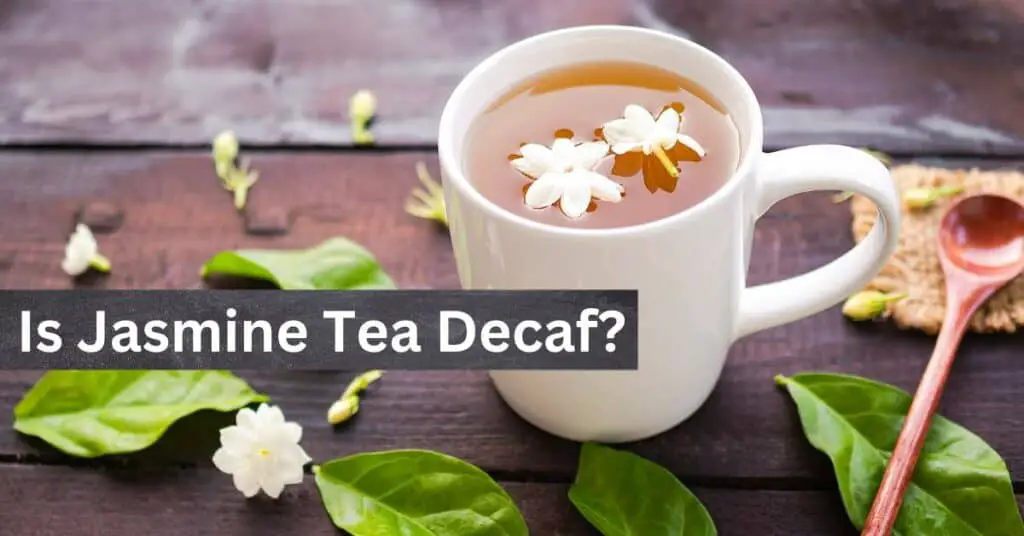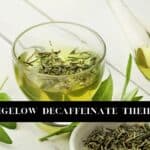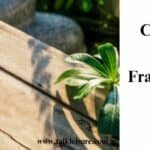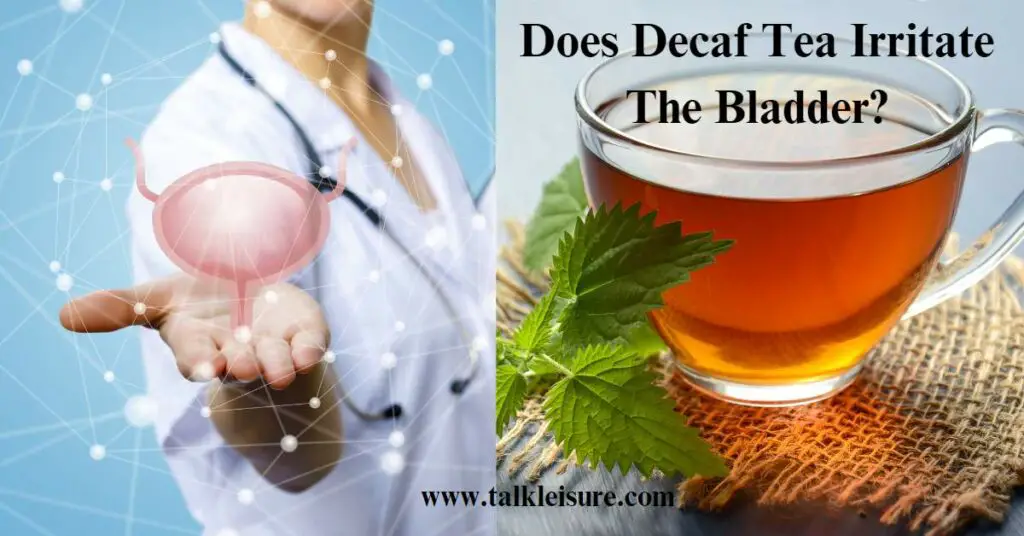Different varieties of tea are available on the market. They provide different aromas and flavors. Tea is an aromatic beverage that helps boost the immune system and is produced using cured and powdered tender tea leaves.
You may also use the fresh, tender leaves when preparing tea. Apart from regular tea, there are currently varieties of flavored teas.
Jasmine tea is a popular option prepared using tea leaves and jasmine flowers. There is a common need for clarification about whether jasmine tea is decaf. If you are also interested in it, this blog is for you!
Pure jasmine tea does not naturally contain any caffeine. In contrast, manufacturers blend it with different teas to enhance the aroma and flavor. Therefore, jasmine tea contains caffeine. However, those intolerant to caffeine can try jasmine decaf green tea, produced using decaffeinated tea leaves.
What is Jasmine Tea?
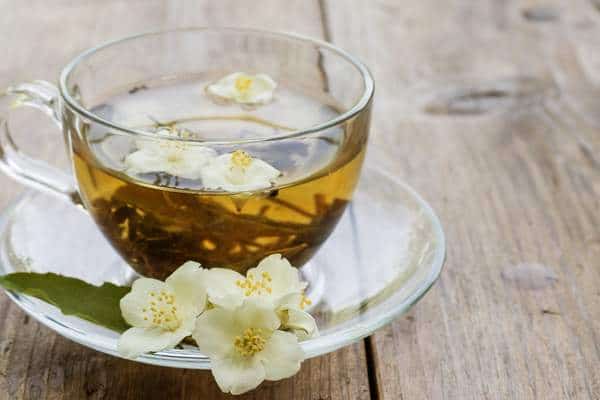
Jasmine tea is a popular beverage scented with the blossoms of jasmine flowers. Most of the jasmine teas are green teas, but you may also find black and white jasmine tea.
The blend of green tea leaves with blossoms of common jasmine or sampaguita provides most of the benefits you would gain from green tea.
Blending jasmine blossoms with white, black, green, or oolong tea will help produce an elegantly scented tea.
Does Jasmine Tea Contain Caffeine?
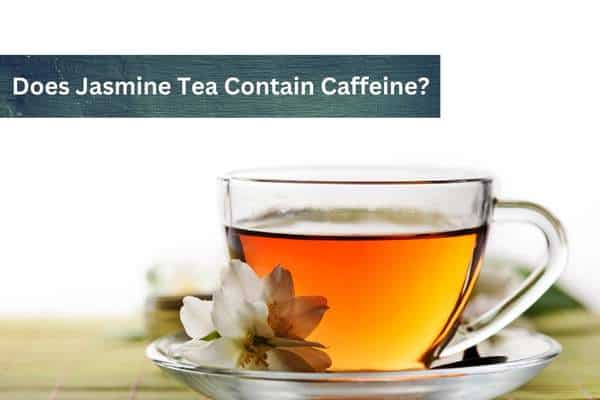
Are you limiting your daily caffeine intake?
If yes, checking the food items or beverages you consume with caffeine is essential.
Even though you plan a caffeine-free diet, giving up your morning beverage is unnecessary. Instead, you can go for caffeine-free or decaffeinated drinks.
Some people love jasmine tea’s flavor and aroma and intend to drink it daily. So, is jasmine tea decaf?
Pure jasmine tea is naturally caffeine-free, but when you purchase jasmine tea powder from the market, it may contain caffeine. This is because jasmine blossoms are blended with different tea leaves containing caffeine. Like pure teas, jasmine tea has around 20–60 mg of caffeine per cup.
The caffeine content will change according to the types of tea leaves used, the processing method, and the brewing method.
Unfortunately, jasmine tea is not a good option for caffeine-intolerant people. In contrast, if you like the aroma of jasmine blossoms, you can go for decaf jasmine green tea.
Decaffeinated Jasmine Green Tea
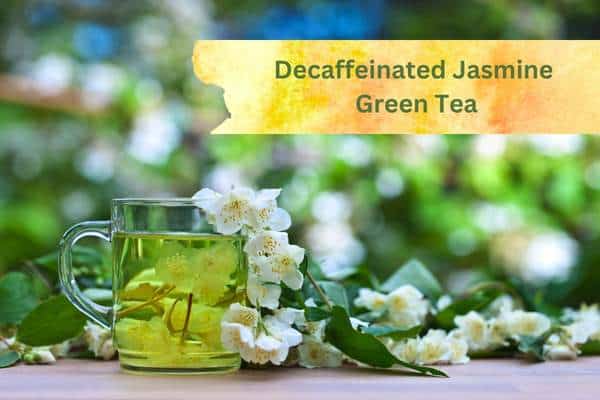
Decaffeination involves using different methods, like carbon dioxide, ethyl acetate, methylene chloride, or water processing, to extract caffeine from tea leaves.
Decaffeinating will help remove most of the caffeine content but will not make the beverage completely caffeine-free. Decaffeinated beverages will contain around 2–3% caffeine, a very small quantity. Jasmine teas have a sweet aroma that will induce relaxation.
Jasmine decaf green tea is an excellent choice for limiting caffeine intake.
Jasmine tea is naturally decaffeinated using the carbon dioxide effervescent process. This natural decaffeinating process helps remove caffeine while retaining most nutrients and flavors. Hence, you can obtain a mild and smooth jasmine decaf tea.
Initially, the manufacturers decaffeinated the green tea leaves using carbon dioxide. Then use these decaffeinated green tea leaves and jasmine blossoms to produce jasmine decaf tea.
Jasmine blossom will add visual appeal as well as flavor to your decaf tea.
Benefits of Consuming Jasmine Decaf Tea
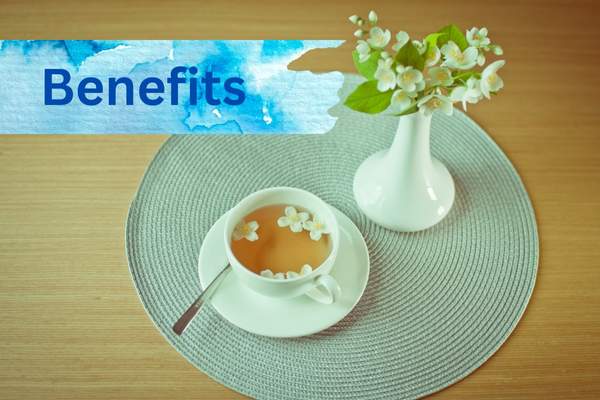
Some people say that drinking decaffeinated beverages does not contain any health benefits because, during decaffeination, all the nutrients get removed.
This is false since decaffeinated beverages retain most of the nutrients and will have the majority of the benefits that you will get from a regular beverage.
Similarly, consuming jasmine decaf tea also provides various advantages.
The biggest pro is that you can drink this beverage anytime, as it won’t disturb your sleep routine. It also strengthens your immune system, slows aging, prevents cancer, and helps you relax. Since this beverage contains very low caffeine (2.5 mg per cup), it will suit caffeine-intolerant people.
The cons of drinking decaffeinated tea
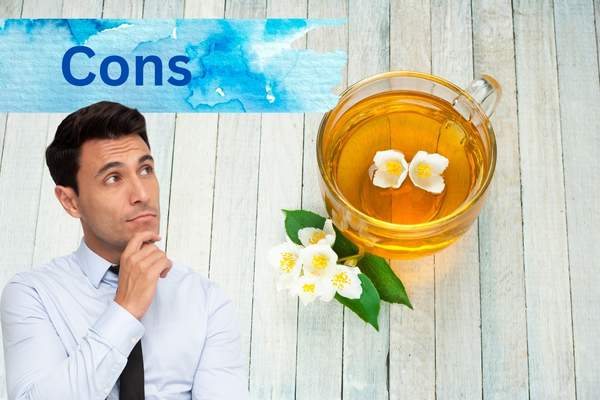
On the flip side of the coin, there are a few cons related to decaffeinated tea. This applies to most decaffeinated beverages, including jasmine decaf tea.
The widely used decaffeinating method is either methylene chloride or ethyl acetate, which are affordable.
In contrast, these decaffeinated methods are toxic and not safe. Hence, purchasing decaffeinated tea using water or carbon dioxide methods is necessary. Further decaffeinating may remove some essential nutrients from the tea leaves apart from caffeine.
Some Popular Options in Decaf Tea
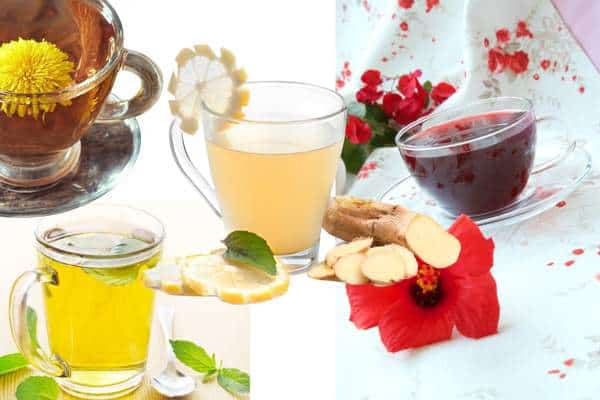
Apart from jasmine decaf green tea, there are various options. Following are some of them:
Thai Ginger Tea
Thai ginger tea is prepared using ginger root and hot water. You can also add a slice of lemon and a spoonful of honey to enhance the taste.
Since there are no tea leaves, you don’t have to worry about the caffeine content. This beverage is completely caffeine-free.
Hibiscus Tea
When making hibiscus tea, rapidly boil the water. Allow the boiled water to cool at room temperature after steeping the tea leaves in it.
Adding hibiscus to this tea will produce a magenta color beverage with sweet and tart flavors. Iced hibiscus tea will be an excellent summertime beverage.
Peppermint Tea
Using the dried peppermint leaves, you can brew peppermint tea. The peppermint leaves are caffeine-free. Since you don’t add tea leaves to peppermint tea, this beverage is caffeine-free.
Dandelion Root Tea
The dandelion root tea will provide similar flavors to the coffee. You can brew this beverage using the root of the dandelion plant and hot water. Hence, it is a 100% caffeine-free alternative.
Bottom Line
Jasmine tea is a flavorful beverage with a pleasant aroma. This tea is manufactured using tea leaves and jasmine blossoms.
The blend of different tea leaves makes the beverage caffeinated. Hence, jasmine tea contains caffeine similar to regular tea.
Suppose you are caffeine intolerant and looking for decaf tea; purchase jasmine decaf green tea. This decaf tea is made using decaffeinated tea leaves and jasmine blossoms.
Since most of the reputed companies manufacture jasmine decaf green tea using natural carbon dioxide decaffeination, it is safe for consumption.
We hope this blog was informative!
FAQs
Is There Decaf Jasmine Tea?
Yes, jasmine decaf green tea is made from decaffeinated tea leaves. Hence, this tea contains only 2.5mg of caffeine per cup.
Does Jasmine Tea Contain Caffeine?
Pure jasmine tea does not contain any caffeine. In contrast, when you mix it with different tea leaves, it contains caffeine.
How Does Jasmine Tea Get Decaffeinated?
Most companies use the carbon dioxide decaffeinating process. The tea leaves are subjected to high temperatures and pressure until carbon dioxide reaches the supercritical state.
In this state, the carbon dioxide will transform into a solvent and extract the caffeine in the tea leaves.

